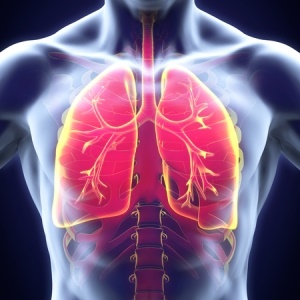
The lungs are a pair of cone-shaped, soft, spongy, pinkish organs. They're situated in the chest, behind your ribcage, with the heart between the right lung and the left lung.
We breathe with our lungs: inhaling oxygen-rich air and exhaling carbon monoxide-filled air. The lungs are the only way through which oxygen – the much-needed component to sustain cell function and life – can enter the body. But they also play a vital role in the body’s “waste disposal”, “cleansing” or “toxin removals” department.
We inhale 10,000 litres of air per day
We breathe nearly 25,000 times per day. We inhale more than 10,000 liters of air per day.
This air is mostly oxygen and nitrogen. In addition, there are small amounts of other gases, floating bacteria and viruses. It also contains the products of tobacco smoke, car exhaust fumes and other pollutants from the atmosphere.
Air enters the body through the nose or mouth, travels down the throat and trachea (windpipe) into the chest through a pair of air tubes called the left bronchus and the right bronchus, leading respectively to the left and right lungs.
The right lung is slightly bigger than the left lung. The right lung has three lobes and the left lung two lobes. The lobes are further divided in lobules. Each of the lobules are served by smaller branches of the bronchi.
The bronchi
The bronchi divide and subdivide into narrower and shorter branching tubes till they end in a network of 3 million air sacs called alveoli. Between the trachea (windpipe) and the alveoli, the bronchi branches look like an upside-down tree.
Alveoli
Alveoli are the final destination for inhaled air in the lungs. It is a network of about 3 million balloon-like air sacs, located at the ends of the lungs' air passages.
The alveoli are the centres of gas exhange.
Blood is brought from the body to the alveoli through a fine network of pulmonary capillaries. The barrier seperating the air and blood is extremely thin - 50 times thinner than a sheet of tissue paper.
A surface as large as a tennis court is available for gas exchange.
In a resting state, it takes about a minute for the total blood volume of the body - about 5 litres - to pass through the lungs. It takes a red blood cell a mere fraction of a second to pass through the capillary network. Gas exchange occurs instantaneously during these milliseconds.
Air pollutants can affect our lungs in many ways.
They may cause irritation and discomfort. Some inhaled materials can cause illness or death.
The lungs have biological barriers and defense mechanisms to inactivate some of the disease-causing pollutants. When these natural defenses fail, disease may follow.
Medical problems at birth or during pregnancy and growth can affect lung development. Later in life, smoking, occupational pollutants or accidents can damage the lungs, allowing air pollutants to break through the defense system of the lungs resulting in lung disease.
The respiratory and non-respiratory functions of the lungs
The respiratory function = gas exchange.
The lungs get oxygen into the blood and remove carbon monoxide from the blood and the body.
The non-respiratory function = mechanical, biochemical and physiological defense system and "cleaners".
The lungs protect the body from potentially harmful airborne pollutants and toxic chemicals produced by our own body. The are the first line of defense against airborne bacterial and viral agents, other infectious agents and irritants. They remove volatile particles and substances generated within the body.
The lungs control the flow of water, ions and proteins across its cellular structures. With the liver, they act as the metabolic-product "removals services" of the body. The lungs manufacture certain essential hormones and other chemicals for very specific functions in the body.
- (Health24.com)




 Publications
Publications
 Partners
Partners











